Filter by
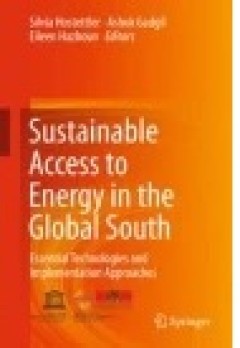
Sustainable Access to Energy in the Global South
Presenting the best papers of the 3rd EPFL-UNESCO Chair Conference on Technologies for Development, this publication offers a valuable collection of innovative case studies exploring access to energy and renewable energy technologies in the Global South. It investigates the key determinants for successfully providing energy to resource-poor communities and examines a wide range of technologies …
- Edition
- -
- ISBN/ISSN
- 978-3-319-20209-9
- Collation
- XVIII, 254
- Series Title
- -
- Call Number
- -
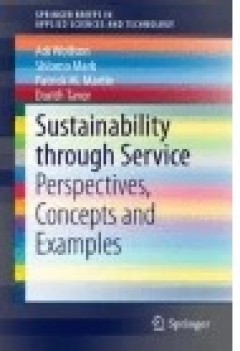
Sustainability through Service
This book discusses the mutual relationship between service and sustainability. It covers methodologies and approaches and describes measurements and tools that can promote sustainability on the service market. Lastly, it presents the different applications of sustainability, together with examples of sustainable services. Environmental concerns have become integral to any decision-making proc…
- Edition
- -
- ISBN/ISSN
- 978-3-319-12964-8
- Collation
- VIII, 85
- Series Title
- SpringerBriefs in Applied Sciences and Technology
- Call Number
- -
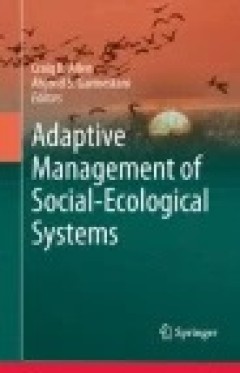
Adaptive Management of Social-Ecological Systems
Adaptive management is an approach to managing social-ecological systems that fosters learning about the systems being managed and remains at the forefront of environmental management nearly 40 years after its original conception. Adaptive management persists because it allows action despite uncertainty, and uncertainty is reduced when learning occurs during the management process. Often termed…
- Edition
- Ed. 1
- ISBN/ISSN
- 978-94-017-9682-8
- Collation
- XIII, 264
- Series Title
- -
- Call Number
- 574.5 ADA a

Tourism in Latin America
This book presents eleven case studies of success about Latin America tourism. The cases are embedded in a framework describing the economic and cultural foundations of tourism development in the continent. Mexico, Brazil, Chile and Costa Rica are some of the Latin countries which have become examples and models for touristic development, respect for the environment and social inclusion. The bo…
- Edition
- 1
- ISBN/ISSN
- 978-3-319-05734-7
- Collation
- XII, 246
- Series Title
- -
- Call Number
- -
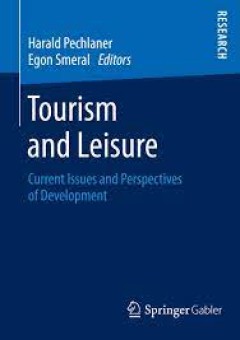
Tourism and Leisure
The Festschrift in honor of Prof. Dr. Peter Keller, president of the International Association of Scientific Experts in Tourism (AIEST) since 1994, represents a wide range of tourism research as well as the current state of the ongoing debates in tourism as a scientific research field. The aim is to cover multiple topics and trends in travelling and to discuss future development possibilities i…
- Edition
- 1
- ISBN/ISSN
- 978-3-658-06659-8
- Collation
- IX, 389
- Series Title
- -
- Call Number
- -

Tourism and Hospitality Development Between China and EU
Tourism and hospitality industry is facing a substantial amount of opportunities and challenges due to the globalization. The Third International Conference on Tourism and Hospitality between China and Spain (ICTCHS) provides a unique global forum for academics, thought leaders and key industry practitioners from diverse backgrounds and interests to meet, discuss and debate critical issues that…
- Edition
- 1
- ISBN/ISSN
- 978-3-662-51264-7
- Collation
- XV, 276
- Series Title
- -
- Call Number
- -
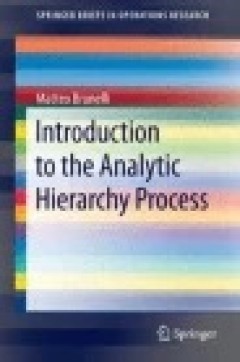
Introduction to the Analytic Hierarchy Process
The Analytic Hierarchy Process (AHP) has been one of the foremost mathematical methods for decision making with multiple criteria and has been widely studied in the operations research literature as well as applied to solve countless real-world problems. This book is meant to introduce and strengthen the readers’ knowledge of the AHP, no matter how familiar they may be with the topic. This…
- Edition
- -
- ISBN/ISSN
- 978-3-319-12502-2
- Collation
- -
- Series Title
- -
- Call Number
- -

Adaptation to Climate Change and Sea Level Rise: The Case Study of Coastal Co…
The book provides a concise and interdisciplinary outlook on the impacts of climate change on coastal areas and how coastal communities adapt to them. The first chapter analyses how sea level rise, changing ocean conditions, or increased climate variability and the socio-environmental context of the coastal zone leads to vulnerable communities. The second chapter addresses adaptation strategies…
- Edition
- Ed. 1
- ISBN/ISSN
- 978-94-017-9888-4
- Collation
- VI, 100
- Series Title
- SpringerBriefs in Environmental Science
- Call Number
- 551.6 WEI a

AdS/CFT Duality User Guid
This book describes applications of the AdS/CFT duality to the "real world." The AdS/CFT duality is an idea that originated from string theory and is a powerful tool for analyzing strongly-coupled gauge theories using classical gravitational theories. In recent years, it has been shown that one prediction of AdS/CFT is indeed close to the experimental result of the real quark–gluon plasma. Si…
- Edition
- Ed. 1
- ISBN/ISSN
- 978-4-431-55441-7
- Collation
- XI, 294
- Series Title
- Lecture Notes in Physics
- Call Number
- 530.12 NAT a
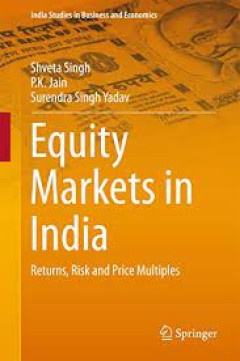
Equity Markets in India Returns, Risk and Price Multiples
The book presents a comprehensive view of the Indian equity markets over the past two decades (1994-2014). Equity markets constitute the most important segment of stock exchanges; in fact, the status of equity returns is, by and large, considered as a barometer of the state of a country’s economy. Returns earned by the equity investors on their funds invested in equity markets have become a d…
- Edition
- -
- ISBN/ISSN
- 978-981-10-0868-9
- Collation
- 8 b/w illustrations, 8 illustrations in colour
- Series Title
- -
- Call Number
- -
 Computer Science, Information & General Works
Computer Science, Information & General Works  Philosophy & Psychology
Philosophy & Psychology  Religion
Religion  Social Sciences
Social Sciences  Language
Language  Pure Science
Pure Science  Applied Sciences
Applied Sciences  Art & Recreation
Art & Recreation  Literature
Literature  History & Geography
History & Geography